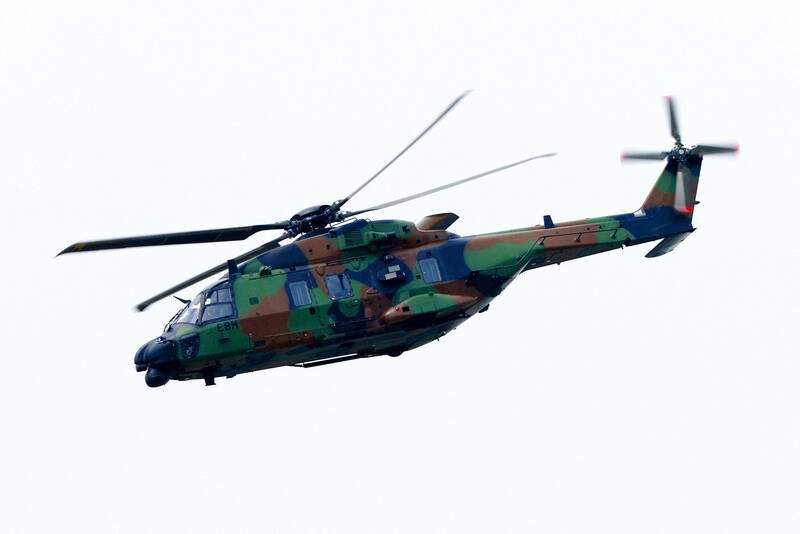The Norwegian government and a trio of European aerospace manufacturers on Monday agreed to settle mutual claims for damages after the NATO nation axed an order for delayed NH90 submarine-hunting helicopters, heading off a potentially awkward defense industry trial.
NHIndustries and owners Airbus, Leonardo and GKN Fokker agreed to pay 305 million euros (US$355.7 million) on top of 70 million euros already paid, and took back the mothballed helicopters and parts, the two sides said in a joint statement.
That is a fraction of the 2.86 billion euros Norway had claimed in its suit, part of which was meant to cover the cost of buying US-made replacements, but the companies agreed as part of the deal to drop their own counter claim for 730 million euros.

Photo: Reuters
The settlement, confirming a deal reported earlier by Reuters, came one week before the scheduled start of five months of Oslo hearings in what was seen as an unusually sensitive case as NATO rearms to counter submarine threats in Europe’s north.
Norwegian forces monitor a 2 million square kilometer area of the North Atlantic for NATO — Russia’s Northern Fleet is based on the Kola Peninsula, an area in the Arctic bordering Norway.
The NH90 military helicopter first flew almost 30 years ago and is one of Europe’s flagship arms projects. It boasts the first fully computerized controls for a military helicopter, but has been plagued by criticism over delays and maintenance costs.

Photo: Norwegian Army via Reuters
The settlement ends a procurement saga which has dragged on for almost a quarter of a century since Norway ordered 14 NH90s in 2001 to outfit its maritime forces.
In 2022, Norway said it would cancel the NH90 order due to delays and maintenance problems and seek a refund from the consortium, which called the move “legally groundless.”
In 2023, Sweden threatened to follow suit and Australia sped up the retirement of its own fleet.
The Norwegian defense ministry has said deliveries should have been completed by the end of 2008 but that it faced more than a decade of delays and missing parts, hampering flight operations.
Preparations for the much-anticipated public trial starting tomorrow, including arrangements for handling classified material, had pushed ahead after attempts at mediation failed.
Although some hearings were expected to be held behind closed doors, the case was set to expose significant shortfalls after a government filing called the problems with the NH90 “almost unparalleled in any other contract for the manufacturing of military equipment.”
The first partially completed helicopter was delivered six years late and it was not until 16 years after the contract was signed that the first fully operational aircraft was deployed — 12 years behind schedule, the government said in its complaint.
By the time the contract was cancelled in 2022, Norway was getting an average of 100 flight hours per year out of its NH90 helicopters, compared with a target of 400 flight hours per year, it added.
Norway’s claim had included 2.1 billion euros to cover the purchase of replacement MH-60 Seahawks — part of the Black Hawk family of helicopters — from Lockheed Martin’s Sikorsky, according to the filings reviewed by Reuters.
In its counterclaim, NHIndustries acknowledged that the project had faced difficulties and partially blamed delays in agreeing specifications.
Norway’s requirements include operating reliably in harsh Arctic weather along Europe’s longest coastline. The company called the size of the claim “shockingly inflated” and said that some of the helicopters had been used for years.
NHIndustries has said it has turned the corner on the availability of NH90 support and is preparing upgraded versions.

South Korea’s equity benchmark yesterday crossed a new milestone just a month after surpassing the once-unthinkable 5,000 mark as surging global memory demand powers the country’s biggest chipmakers. The KOSPI advanced as much as 2.6 percent to a record 6,123, with Samsung Electronics Co and SK Hynix Inc each gaining more than 2 percent. With the benchmark now up 45 percent this year, South Korea’s stock market capitalization has also moved past France’s, following last month’s overtaking of Germany’s. Long overlooked by foreign funds, despite being undervalued, South Korean stocks have now emerged as clear winners in the global market. The so-called “artificial intelligence

‘SEISMIC SHIFT’: The researcher forecast there would be about 1.1 billion mobile shipments this year, down from 1.26 billion the prior year and erasing years of gains The global smartphone market is expected to contract 12.9 percent this year due to the unprecedented memorychip shortage, marking “a crisis like no other,” researcher International Data Corp (IDC) said. The new forecast, a dramatic revision down from earlier estimates, gives the latest accounting of the ongoing memory crunch that is affecting every corner of the electronics industry. The demand for advanced memory to power artificial intelligence (AI) tasks has drained global supply until well into next year and jeopardizes the business model of many smartphone makers. IDC forecast about 1.1 billion mobile shipments this year, down from 1.26 billion the prior

People stand in a Pokemon store in Tokyo on Thursday. One of the world highest-grossing franchises is celebrated its 30th anniversary yesterday.

Chinese artificial intelligence (AI) start-up DeepSeek’s (深度求索) latest AI model, set to be released as soon as next week, was trained on Nvidia Corp’s most advanced AI chip, the Blackwell, a senior official of US President Donald Trump’s administration said on Monday, in what could represent a violation of US export controls. The US believes DeepSeek will remove the technical indicators that might reveal its use of American AI chips, the official said, adding that the Blackwells are likely clustered at its data center in Inner Mongolia, an autonomous region of China. The person declined to say how the US government received